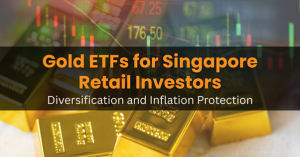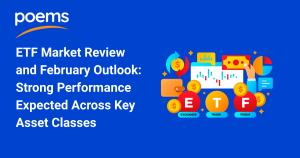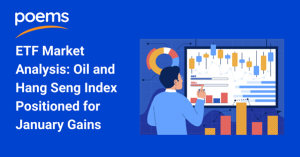5 Macro Trends for 2018 and Beyond April 19, 2018

Introduction
The new age of economic, cultural and political revolution has transformed how we lead our daily lives. Obsolete industries will be replaced by up-and-coming enterprises and businesses will be forced to adapt to the changing environment in order to prosper and survive.
The shift in macro trends has led many investors to seek ways to earn higher returns instead of relying on traditional broad-based index investing, such as investing on blue chip stocks in the Straits Times Index (STI) or the Standard & Poor’s 500 (S&P 500).
Thematic investing is a strategy whereby investors identify macro trends that will benefit certain sectors and invest in stocks in these sectors, with the objective of beating the broad-based market returns.
Exchange-Traded Funds
Alternatively, investors can invest in Exchange-Traded Funds (ETFs) as part of their thematic investment strategy.
ETFs allow investors to gain exposure to a particular market, sector, country, theme or strategy etc. They are investment vehicles that carry a basket of securities as its underlying assets. With ETFs, investors can achieve diversification and gain access to their desired market theme at the same time.
Moreover, investors do not have to pick individual company stocks for their investment strategies. They can identify the specific ETFs that tracks their desired market themes. The fund managers will select and rebalance the ETF’s holdings according to the investment objective of the ETF.
Without further ado, here are five macro trends that investors may be interested in and the list of ETFs that track the performances of the respective sectors.
1. Healthcare
The world’s ageing population (> 65 years old) will increase by eight percent, from 559 million in 2015 to 604 million in 2020[1]. As such, the global healthcare spending is projected to reach US$8.7 trillion in 2020 . Healthcare ETFs invest in stocks of companies that are involved in the healthcare industry. They include pharmaceuticals, hospital, medical devices makers, biotechnology firms and many more, which will benefit from the increased in global healthcare spending.
ETF | |||
|---|---|---|---|
| Ticker | XLV | VHT | IXJ |
| Inception Date | 22 Dec 1998 | 30 Jan 2004 | 16 Nov 2001 |
| AUM (US$) | 15.25 billion | 7.11 billion | 1.56 billion |
| Expense ratio | 0.13% | 0.10% | 0.48% |
| Number of Holdings | 62 | 362 | 109 |
| Top 3 Holdings | – Johnson & Johnson– UnitedHealth Group Inc– Pfizer Inc | – Johnson & Johnson– UnitedHealth Group Inc– Pfizer Inc | – Johnson & Johnson– UnitedHealth Group Inc– Pfizer Inc |
2. Technology
2017 was a bumper year for technology stocks in the US. The Technology Select Sector outperformed the other 10 GICS (Global Industry Classification Standard) sectors by rising 38.83% over the year[2]. The FAANG acronym refers to the five most popular and best performing technology stocks in the market, namely Facebook, Apple, Amazon, Netflix and Google.
The technology sector was also the top performing sector outside of the US in 2017. The MSCI EMU (European Economic and Monetary Union) Technology Sector Index and the MSCI EM (Emerging Markets) Technology Sector Index were the top performing sector indices in Europe and Emerging Markets respectively.
Technology stocks tend to be more volatile than other sector stocks, as they have a higher risk/reward profile. Investors who wish to gain exposure to the technology sector can utilise Technology ETFs to diversify and lower the volatility of their investment.
ETF | |||
|---|---|---|---|
| Ticker | QQQ | XLK | VGT |
| Inception Date | 10 Mar 1999 | 22 Dec 1998 | 30 Jan 2004 |
| AUM (US$) | 60.37 billion | 20.39 billion | 18.42 billion |
| Expense ratio | 0.20% | 0.13% | 0.10% |
| Number of Holdings | 110 | 73 | 358 |
| Top 3 Holdings | – Apple Inc– Microsoft Corp– Amazon Inc | – Apple Inc– Microsoft Corp– Facebook Inc | – Apple Inc– Microsoft Corp– Facebook Inc |
3. Emerging Markets
The term emerging market refers to a country that has characteristics of a developed market but is not as advanced as developed countries. Emerging markets maintain economies and infrastructure that are more advanced than developing and frontier countries. The term BRIC refers to the four largest emerging markets in the world, namely Brazil, Russia, India and China.
Emerging markets offer the advantages of a cheaper labour force and operating cost for multinational companies (MNCs). The prospect of better paying jobs will help to increase the purchasing power of the local populations and further drive up the economy of the emerging markets.
ETF | |||
|---|---|---|---|
| Ticker | VWO | IEMG | SCHE |
| Inception Date | 10 Mar 2001 | 22 Oct 2012 | 14 Jan 2010 |
| AUM (US$) | 68.01 billion | 50.61 billion | 5.31 billion |
| Expense ratio | 0.14% | 0.14% | 0.13% |
| Number of Holdings | 4,123 | 1,920 | 917 |
| Top 3 Holdings | – Tencent Holdings Ltd– Taiwan Semiconductor Manufacturing Co Ltd– Naspers Ltd | – Tencent Holdings Ltd– Samsung Electronics Co Ltd– Taiwan Semiconductor Manufacturing Co Ltd | – Tencent Holdings Ltd– Taiwan Semiconductor Manufacturing Co Ltd– Alibaba Group Holding Ltd |
4. Consumer Discretionary
Consumer discretionary refers to goods and services that are regarded as non-essential by consumers but are desirable to have. They may include luxury goods, apparel, automobiles, fast food, entertainment and leisure services. Examples of prominent companies that produce consumer discretionary products and services include Netflix, Nike, Walt Disney, Starbucks, McDonald’s etc.
Consumer discretionary sector tends to be very sensitive to economic cycles. In a poor economy, consumers will forgo the purchase of luxury items in favour of allocating more of their income towards consumer staples and savings. Conversely, in a strengthening economy, the demand for consumer discretionary products and services will increase. Hence, amplifying the sales and stock performances for consumer discretionary companies.
According to Phillip Research’s Report, the Conference Board (CB) Consumer Confidence Index has been rising since 2011, from a low of 40.87 to a high of 130.8 in February. Therefore, from a consumer sentiment perspective, we might be in another euphoric market.
ETF | |||
|---|---|---|---|
| Ticker | XLY | VCR | FDIS |
| Inception Date | 22 Dec 1998 | 30 Jan 2004 | 24 Oct 2013 |
| AUM (US$) | 13.15 billion | 2.62 billion | 469.17 million |
| Expense ratio | 0.13% | 0.10% | 0.08% |
| Number of Holdings | 83 | 370 | 352 |
| Top 3 Holdings | – Amazon.com Inc– Home Depot Inc– Comcast Corp | – Amazon.com Inc– Home Depot Inc– Comcast Corp | – Amazon.com Inc– Home Depot Inc– Comcast Corp |
5. Defence
Global defence expenditure will grow for the fifth consecutive year, with the spending predicted to hit US$1.67 trillion in 2018. The expenditure is set to reach its highest level since the end of the Cold War. The increase in defence spending is an indicator of improving global economic performance, as well as a response to instability in some of the key regions. Another main reason is the increase in the US Department of Defence’s budget by Trump and his administration. The US accounts for 40 percent of global defence expenditure and any changes in US’s defence budget allocation will affect the defence spending worldwide[3].
ETF | |||
|---|---|---|---|
| Ticker | ITA | XAR | PPA |
| Inception Date | 05 May 2006 | 29 Sep 2011 | 26 Oct 2005 |
| AUM (US$) | 5.98 billion | 1.32 billion | 1.03 billion |
| Expense ratio | 0.44% | 0.35% | 0.64% |
| Number of Holdings | 39 | 36 | 53 |
| Top 3 Holdings | – Boeing Co– United Technologies Corp– Lockheed Martin Corp | – Aerovironment Inc– Aerojet Roketdyne Holdings– Transdigm Group Inc | – Boeing Co– Honeywell International Inc– Lockheed Martin Corp |
Conclusion
With the market, business and environmental conditions constantly changing, there are plenty of macro trends for investors to exploit. ETF is a convenient investment tool that enables investors to gain exposure to these macro trends, without the need to choose specific individual company stocks for their investment strategies.
ETF information is accurate as of 15 April 2018.
Reference:
- [1] https://www2.deloitte.com/content/dam/Deloitte/global/Documents/Life-Sciences-Health-Care/gx-lshc-2017-health-care-outlook-infographic.pdf
- [2] http://www.convexcm.com/a-banner-year-for-technology-sector/
- [3] http://news.ihsmarkit.com/press-release/aerospace-defense-security/global-defence-spending-hit-post-cold-war-high-2018-janes-i
Disclaimer
These commentaries are intended for general circulation. It does not have regard to the specific investment objectives, financial situation and particular needs of any person who may receive this document. Accordingly, no warranty whatsoever is given and no liability whatsoever is accepted for any loss arising whether directly or indirectly as a result of any person acting based on this information. Opinions expressed in these commentaries are subject to change without notice. Investments are subject to investment risks including the possible loss of the principal amount invested. The value of the units and the income from them may fall as well as rise. Past performance figures as well as any projection or forecast used in these commentaries are not necessarily indicative of future or likely performance. Phillip Securities Pte Ltd (PSPL), its directors, connected persons or employees may from time to time have an interest in the financial instruments mentioned in these commentaries. Investors may wish to seek advice from a financial adviser before investing. In the event that investors choose not to seek advice from a financial adviser, they should consider whether the investment is suitable for them.
The information contained in these commentaries has been obtained from public sources which PSPL has no reason to believe are unreliable and any analysis, forecasts, projections, expectations and opinions (collectively the “Research”) contained in these commentaries are based on such information and are expressions of belief only. PSPL has not verified this information and no representation or warranty, express or implied, is made that such information or Research is accurate, complete or verified or should be relied upon as such. Any such information or Research contained in these commentaries are subject to change, and PSPL shall not have any responsibility to maintain the information or Research made available or to supply any corrections, updates or releases in connection therewith. In no event will PSPL be liable for any special, indirect, incidental or consequential damages which may be incurred from the use of the information or Research made available, even if it has been advised of the possibility of such damages. The companies and their employees mentioned in these commentaries cannot be held liable for any errors, inaccuracies and/or omissions howsoever caused. Any opinion or advice herein is made on a general basis and is subject to change without notice. The information provided in these commentaries may contain optimistic statements regarding future events or future financial performance of countries, markets or companies. You must make your own financial assessment of the relevance, accuracy and adequacy of the information provided in these commentaries.
Views and any strategies described in these commentaries may not be suitable for all investors. Opinions expressed herein may differ from the opinions expressed by other units of PSPL or its connected persons and associates. Any reference to or discussion of investment products or commodities in these commentaries is purely for illustrative purposes only and must not be construed as a recommendation, an offer or solicitation for the subscription, purchase or sale of the investment products or commodities mentioned.
About the author
Mr Joel Lim
ETF Specialist
Joel graduated from Singapore Institute of Management, University of London with a First Class Honours in Business. He was the recipient of SIM University of London’s Top Student Bronze Award in 2017 and was the worldwide examination topper for the “Financial Management” module in 2016. Joel was also commended by University of London for his excellent performance in the 2014 Examinations. Joel is involved in ETF education, providing trading ideas and support to traders, dealers and fund managers. Joel also works closely with ETF issuers to educate retail investors about new ETFs during the Initial Offering Period.

 Gold ETFs for Singapore Retail Investors: Diversification and Inflation Protection
Gold ETFs for Singapore Retail Investors: Diversification and Inflation Protection  ETF Market Review: February Outlook Signals Strong Performance
ETF Market Review: February Outlook Signals Strong Performance  ETF Market Analysis: Oil & Hang Seng Set for January Gains
ETF Market Analysis: Oil & Hang Seng Set for January Gains  Buffer ETFs — What Are They and How Do They Work?
Buffer ETFs — What Are They and How Do They Work? 






